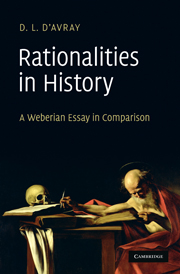Book contents
- Frontmatter
- Contents
- Preface and acknowledgements
- Introduction
- 1 Universal and specific rationalities: theories
- 2 The structure of values and convictions
- 3 Dynamics of values and convictions
- 4 The instrumental–conviction rationality interface
- 5 Formal rationality
- 6 The formal–substantive interface
- Conclusions
- Appendix: rationalities in a case before the Congregation of the Council
- Bibliography
- Index
1 - Universal and specific rationalities: theories
Published online by Cambridge University Press: 05 June 2012
- Frontmatter
- Contents
- Preface and acknowledgements
- Introduction
- 1 Universal and specific rationalities: theories
- 2 The structure of values and convictions
- 3 Dynamics of values and convictions
- 4 The instrumental–conviction rationality interface
- 5 Formal rationality
- 6 The formal–substantive interface
- Conclusions
- Appendix: rationalities in a case before the Congregation of the Council
- Bibliography
- Index
Summary
Rationality as universal: Rational Choice Theory
At one end of the spectrum of ideas about rationality is the view that rationality is one, not multiple: that all societies have essentially the same rationality so that human action generally can be analysed in terms of universal modes of reasoning. ‘One rationality’ scholarship takes many forms but one of the most influential is Rational Choice Theory (RCT), which tries to build all thinking on (a) preferences and (b) estimates of the probability of obtaining this or that. It has been fruitfully combined with institutional analysis. RCT is hugely influential in such subjects as political science, sociology, and law, and has even been known to penetrate into literary criticism. The austere economists' version avoids many of the claims of the political scientists and sociologists who use RCT. Rational Choice Theory proves its worth most clearly by showing (for instance) how a series of rational individual decisions can together amount to a collectively irrational process, such as economic booms and crashes. On the other hand, the concept of ‘preferences’ is overworked in some forms of RCT, being forced to stand for convictions and values as well as for preferences in the more normal sense. It will be argued below that preferences do differ from convictions: for one thing the latter involve general principles that can lead to unexpected and up to that point undesired applications.
- Type
- Chapter
- Information
- Rationalities in HistoryA Weberian Essay in Comparison, pp. 29 - 65Publisher: Cambridge University PressPrint publication year: 2010



